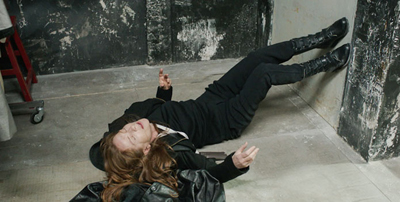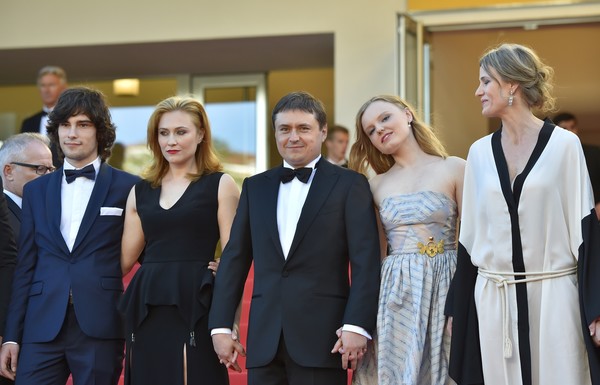I like to start my film festivals with an atypical choice just to get the globe-trotting adventures rolling. So my first screening at TIFF, which I drunkenly forgot the name of the night before -- "Undefebeatable?" "Indestructafeated" -- was a mixed martial arts 'ultimate fighting' movie. I don't only watch movies about actresses, people! Those are just the ones I like best is all. I chased the MMA fighters with some Romanian actressing and French perversity... although it was more like Romanian Actress Perversity (Lhuminita) AND French Actress Perversity (Huppert - who else?)
So basically this was me settling in with each movie on Day One.

Movies make me feel goooooooood.
UNBEATABLE
In many ways Dante Lam's mixed martial arts fighting movie is just one giant wheel of cheese. It's a wheel of cheese so big I was reminded fo the cheez-it commercial as it rolls through Hunnan, Beijing, Macau and into Hong Kong before it slams into its bone crunching finales. The movie never met a plot advancing montage it didn't like and there's a lot of plot so cue the music again! (I may never be able to hear "The Sound of Silence" without shuddering at the ways its egregiously deployed here and the incongruous things it accompanies.)
 Eddie Peng & Nick Cheung are trainee and coach in Unbeatable
Eddie Peng & Nick Cheung are trainee and coach in Unbeatable
Yet despite these deal breakers, the only thing broken is a few bones but no spoilers! The movie totally works and that's largely due to its character focus even though it clearly knows how to stage and film a fight scene, something that too few action movies can claim. Nick Cheung headlines as a one time shady boxing champ who has fallen so far in life that he can't shake the name "Scumbag" even though he's become a decent guy. Taiwanese Canadian actor Eddie Peng is his young fiercely committed protege and the film. Their chemistry is so great that they can even pull off a really funny winking scene about the latent homoeroticism of wrestling without making you hate them The acting from the supporting players is broad, sure, but vivid. The actress playing a young girl Scumbag befriends (I can't find her name) gets some of the best scenes and a really great final moment -- "Come stomp on me!" which makes playful make-believe violence into affection. And also accurately describes both the movies love of its genre and the masochistic impulses of the MMA set. Unbeatable isn't really unbeatable as movies go but it is not remotely unenjoyable. B
 CHILD'S POSE
CHILD'S POSE
Romania's great actress Lhuminita Gheorghiu (The Death of Mr Lazarescu, 4 Months3 Weeks and 2 Days) has a doozy of a role in Child's Pose. Her character Cornelia, is a rich and smug society wife. Cornelia is rarely seen without a drink in one hand and a stubby cigarette in the other and she still has hands free for figuratively greasing palms around town, or literally greasing down her son's back in one provocative scene. Let's just say that she seems to be a spiritual film cousin to Angelica Huston's Lily in The Grifters. One might derisively and accurately refer to Cornelia as "a piece of work."
This fine Romanian picture (is there another kind?) won the Golden Bear in Berlin earlier this year and is now the country's Oscar submission for the upcoming Foreign Film race. The best thing about Child's Pose, aside from Lhuminita's intense gripping star turn, might be the way it so thoroughly isn't what it keeps seeming to be. Cornelia is the anti-hero of this fine Romanian picture (is there another kind?) a woman who will stop at nothing to keep her son from being held responsible for a car accident which killed a young boy. But to the movie's credit she doesn't appear to be at first (when your sympathies are with her, or at least warily near her - she's not exactly a warm presence) and doesn't quite remain so even after her often heinous behavior. It's a slippery thorny picture, forcing you to observe lots of ugly situations, and confront relatable if unpleasant emotions as it shapeshifts subtly from biting satire about the entitlement of wealth, to really uncomfortable family drama, to tense bureaucratic police procedural. It finally comes crashing head on into the ugly truth, the very thing Cornelia is most eager to swerve around. B+
 Isabelle Huppert as Maud as Catherine Breillat in Abuse of Weakness
Isabelle Huppert as Maud as Catherine Breillat in Abuse of Weakness
ABUSE OF WEAKNESS
I still have psychic scars from Catherine Breillat's breakthrough Romance (1999) though I tried not to hold that against her when viewing her latest. Abuse of Weakness is an indulgent autobiographical picture of sorts though Catherine is now going by "Maud". Contrary to what any synopsis and the film's first couple of reels suggest the picture is not really about the director's physical illness, but about a post-stroke relationship with a conman who fleeced her of all her money.
 The film opens exceptionally well with credits over white sheets which begin to move oddly, trouble broiling under the pristine surface. The camera moves until we're looking at cinema's great chilly ginger Isabelle Huppert, as Maud, writhing about naked and then very disconcertingly dropping to the floor, her body betraying her. The first few scenes reenact Breillat's debilitating stroke and her physical therapy but the picture doesn't really get started until Maud falls for a true "character" she sees on television, Vilko (Kool Shen) telling her assistant that they just don't make actors like that. She invites the criminal to be the star of her new picture and they begin a friendship wherein he drops in repeatedly and begins to "borrow" money from her. He also repeatedly calls her "perverse" which Isabelle/Maud/Catherine obviously enjoy hearing said about them. Vilko is coldly hesitant to help her in and out of chairs and up and down stairs when she's physically struggling but he's right there with a helpful hand to hold down the checkbook while she scribbles on it.
The film opens exceptionally well with credits over white sheets which begin to move oddly, trouble broiling under the pristine surface. The camera moves until we're looking at cinema's great chilly ginger Isabelle Huppert, as Maud, writhing about naked and then very disconcertingly dropping to the floor, her body betraying her. The first few scenes reenact Breillat's debilitating stroke and her physical therapy but the picture doesn't really get started until Maud falls for a true "character" she sees on television, Vilko (Kool Shen) telling her assistant that they just don't make actors like that. She invites the criminal to be the star of her new picture and they begin a friendship wherein he drops in repeatedly and begins to "borrow" money from her. He also repeatedly calls her "perverse" which Isabelle/Maud/Catherine obviously enjoy hearing said about them. Vilko is coldly hesitant to help her in and out of chairs and up and down stairs when she's physically struggling but he's right there with a helpful hand to hold down the checkbook while she scribbles on it.
This goes on and on until the film's finale a long virtual monologue though lawyers and children occassional egg Maud on in her own confession. Huppert nails it by underplaying, glassily admitting her own stupidity, and rewitnessing from afar what she just lived from afar, never quite "present" in her foolish decisions. Huppert's face is a marvel, trouble always broiling under its glassy surface. Abuse of Weakness has a fine beginning and a killer ending -- too bad there's no movie in the middle. It's all just a series of check-signings and a very vaguely observed relationship that's never truly examined by the protagonist living it or the director filming an actress reliving it. It's as if Breillat is determined to make the same mistakes all over again, botching her own would be exorcism. C
 Saturday, November 30, 2019 at 4:00PM
Saturday, November 30, 2019 at 4:00PM  As Noirvember comes to an end, it's interesting to peruse the current Awards hopefuls in search of some examples of film noir. Lynn Lee already defended the merits of Edward Norton's Motherless Brooklyn, but my attentions were drawn, as usual, to the Best International Feature category. Amid the record-breaking 91 submissions, we can find a peculiar experiment of deconstructed noir archetypes and mechanisms. It comes from one of those countries whose historical lack of a nomination is an absurdity and reflects poorly on the Academy.
As Noirvember comes to an end, it's interesting to peruse the current Awards hopefuls in search of some examples of film noir. Lynn Lee already defended the merits of Edward Norton's Motherless Brooklyn, but my attentions were drawn, as usual, to the Best International Feature category. Amid the record-breaking 91 submissions, we can find a peculiar experiment of deconstructed noir archetypes and mechanisms. It comes from one of those countries whose historical lack of a nomination is an absurdity and reflects poorly on the Academy.










